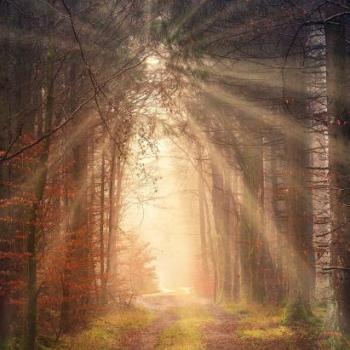
I was proudly ‘spiritual but not religious’ for over twenty years. I’ve only recently dropped the ‘not religious’ label. Here’s why.
‘Not that Religious’
Even before I got acquainted with the New Age movement, I’d begun to call myself ‘not that religious.’ For context, I was raised in a culturally Christian environment in Iceland. We celebrated all the Christian holidays and attended church at christenings, confirmations, weddings and funerals. Before my confirmation, I even studied the New Testament weekly for a year and knew several prayers and psalms by heart. Still, as a family, we didn’t go to church or seek guidance from priests. As I said, ‘not that religious.’
Religion Became the ‘Old Paradigm’
My parents introduced me to the New Age in the early 90s. It was eye-opening. People were free to explore a variety of beliefs and traditions. Some of them I agreed with. Some not. That didn’t matter. Everyone was free to explore.
In that environment, religion became ‘the old paradigm,’ i.e., the old way of thinking. Because most of us had Christian or culturally Christian backgrounds, there was a concerted pushback against Christianity within the New Age movement in Iceland.
In hindsight, that makes sense. Anyone wanting to get out of a relationship knows that a period of dislike is needed to create separation before a new type of friendship can be established (if that ever happens). We pushed back pretty hard.
The Dreaded ‘Patriarchy’
The church in Iceland didn’t do much to deserve the pushback. There weren’t any pedophile problems, mistreatments, or ex-communications. It had just become a stuffy institution devoid of living spirituality. Still, to distance ourselves from the church, we made them look worse.
Later in the 90s, the idea of ‘the patriarchy’ became more prominent within academia, and it spread like wildfire in New Age circles because it seemed to confirm all our misgivings. We were right. Religion was just a collection of old white men intent on dominating the rest of us.
I Had No Problem With Being Not Religious, Until…
I fully embraced the ‘spiritual but not religious’ label within this context. For over twenty years, that’s what I proudly called myself when anyone asked. Granted, the religious landscape in Iceland was relatively flat. It was either the Lutheran government-run church, fringe Christian groups, or the ‘not religious’ label.
During this time, I became enamored with American spiritual teachers who labeled themselves in the same way. They appeared to present their ideas with such freedom of thought, such poetry.
Naturally, when I moved to the USA from Iceland in 2010, I thought I would find a mix of seekers that I could resonate with, people who proudly stood outside of religion and were against it even. What I found was much more complex.
The Complex Landscape of American Religion
We settled in Austin, Texas. I know, I know. That’s not exactly ‘liberal, not religious’ America. But it did teach me a lot.
At first, my ‘not religious’ sentiments grew stronger. Everyone seemed to belong to a church, which we just “had to visit.” And the blending of politics and religion was well beyond anything I had ever experienced. Prayers at the beginning of town hall meetings, a cop openly praying at Popeye’s before gobbling down his chicken, a group of people creating a prayer circle outside of an HOA meeting to pray for a good result in the board elections. These were just a few sights that appeared totally foreign to me.
What Changed?
It took a few years, but my attitude softened once I got to know people and saw how the church fit into their daily lives. I realized that to them, ‘church’ wasn’t a stuffy institution but rather an attempt at community building where people sought everything from friends and business partners to financial and emotional support when life became hard. And, for the record, life here was much harder than in Iceland.
Still, it wasn’t until I studied to become an Interfaith Minister in 2016-2017 that I began seriously thinking about dropping the ‘not religious’ label. Being exposed to a variety of wisdom traditions, attending services, meeting people from various backgrounds, and, most importantly, redefining what the term ‘religion’ meant caused me to reevaluate many things, my chosen theological label being one of them.
What is Religion?
If ‘spirituality’ is defined as a personal journey, how does it relate to ‘religion,’ and how do we define it? Well, both Huston Smith and William James posited that religions arise from personal spiritual experiences but then grow into something bigger. Communities arise. Rituals become codified. Teachings are preserved both verbally and in writing. Institutions are created.
This means that the term ‘religion’ can mean many things to many people.
What I’ve found in my peer group is that most people are more ‘anti-institutional’ than ‘anti-communities of caring.’ Religion, then, can be both something concrete and something that is interpreted based on the predominant worldview of the interpreter.
A Vehicle for Preservation
All the reasons stated above contributed, but I primarily stopped calling myself ‘not religious’ because I realized that religions are vehicles for preserving spiritual truths.
You see, when I started digging into original spiritual texts, I noticed that the ‘freethinking’ and ‘original’ spiritual teachers from America, which I had followed and adored from the late 90s into the early 00s, had borrowed extensively from the wisdom traditions. Their ideas weren’t new. They were variations on a theme.
In musical terms, it’s like realizing that most of the songs we listen to today are variations on the works of Mozart, Beethoven, Rachmaninov, Vivaldi, and Chopin (who knows, maybe they are).
Hurts More Than It Helps
Does religion still have an image problem? Absolutely. But I’ve found that denouncing it hurts more than it helps. It’s like a leaf hacking at the roots of the tree on which it is blooming.
Being able to look at original texts, visit places of worship through interfaith efforts, such as the iACT passport program in Austin, and compare ideas from one religion with another is crucial to my interspiritual efforts.
That is why I no longer call myself spiritual but not religious.
I am just spiritual in my own way.
Gudjon Bergmann
Author and Mindfulness Teacher
Amazon Author Profile
Recommended books:
- Monk of All Faiths: Inspired by The Prophet (fiction)
- Spiritual in My Own Way (memoir)
- Co-Human Harmony: Using Our Shared Humanity to Bridge Divides (nonfiction)
- Experifaith: At the Heart of Every Religion (nonfiction)
- Premature Holiness: Five Weeks at the Ashram (novel)
- The Meditating Psychiatrist Who Tried to Kill Himself (novel)
Picture: CC0 License












